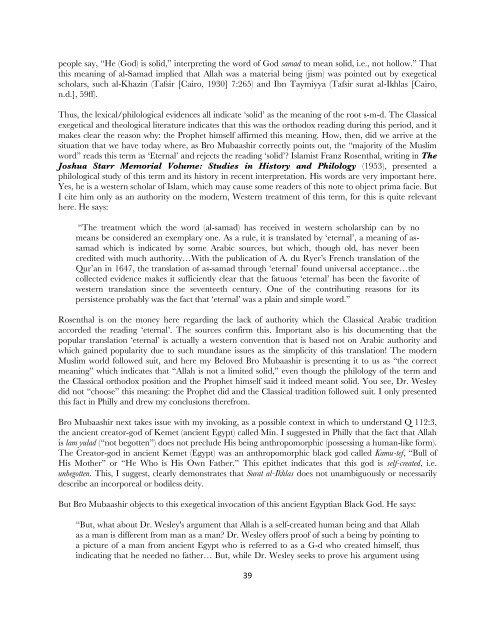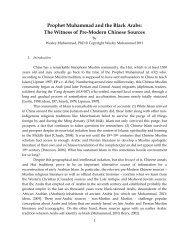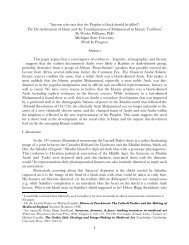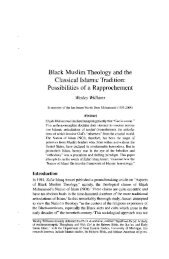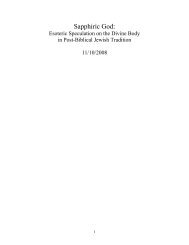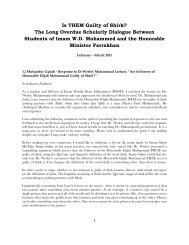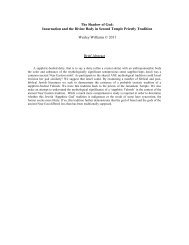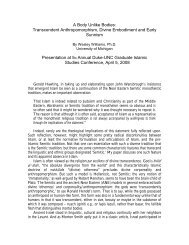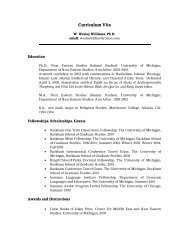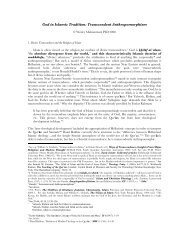Is THEM Guilty of Shirk? - Dr. Wesley Muhammad
Is THEM Guilty of Shirk? - Dr. Wesley Muhammad
Is THEM Guilty of Shirk? - Dr. Wesley Muhammad
Create successful ePaper yourself
Turn your PDF publications into a flip-book with our unique Google optimized e-Paper software.
people say, ―He (God) is solid,‖ interpreting the word <strong>of</strong> God samad to mean solid, i.e., not hollow.‖ That<br />
this meaning <strong>of</strong> al-Samad implied that Allah was a material being (jism) was pointed out by exegetical<br />
scholars, such al-Khazin (Tafsir [Cairo, 1930] 7:265) and Ibn Taymiyya (Tafsir surat al-Ikhlas [Cairo,<br />
n.d.], 59ff).<br />
Thus, the lexical/philological evidences all indicate ‗solid‘ as the meaning <strong>of</strong> the root s-m-d. The Classical<br />
exegetical and theological literature indicates that this was the orthodox reading during this period, and it<br />
makes clear the reason why: the Prophet himself affirmed this meaning. How, then, did we arrive at the<br />
situation that we have today where, as Bro Mubaashir correctly points out, the ―majority <strong>of</strong> the Muslim<br />
word‖ reads this term as ‗Eternal‘ and rejects the reading ‗solid‘? <strong>Is</strong>lamist Franz Rosenthal, writing in The<br />
Joshua Starr Memorial Volume: Studies in History and Philology (1953), presented a<br />
philological study <strong>of</strong> this term and its history in recent interpretation. His words are very important here.<br />
Yes, he is a western scholar <strong>of</strong> <strong>Is</strong>lam, which may cause some readers <strong>of</strong> this note to object prima facie. But<br />
I cite him only as an authority on the modern, Western treatment <strong>of</strong> this term, for this is quite relevant<br />
here. He says:<br />
―The treatment which the word (al-samad) has received in western scholarship can by no<br />
means be considered an exemplary one. As a rule, it is translated by ‗eternal‘, a meaning <strong>of</strong> assamad<br />
which is indicated by some Arabic sources, but which, though old, has never been<br />
credited with much authority…With the publication <strong>of</strong> A. du Ryer‘s French translation <strong>of</strong> the<br />
Qur‘an in 1647, the translation <strong>of</strong> as-samad through ‗eternal‘ found universal acceptance…the<br />
collected evidence makes it sufficiently clear that the fatuous ‗eternal‘ has been the favorite <strong>of</strong><br />
western translation since the seventeeth century. One <strong>of</strong> the contributing reasons for its<br />
persistence probably was the fact that ‗eternal‘ was a plain and simple word.‖<br />
Rosenthal is on the money here regarding the lack <strong>of</strong> authority which the Classical Arabic tradition<br />
accorded the reading ‗eternal‘. The sources confirm this. Important also is his documenting that the<br />
popular translation ‗eternal‘ is actually a western convention that is based not on Arabic authority and<br />
which gained popularity due to such mundane issues as the simplicity <strong>of</strong> this translation! The modern<br />
Muslim world followed suit, and here my Beloved Bro Mubaashir is presenting it to us as ―the correct<br />
meaning‖ which indicates that ―Allah is not a limited solid,‖ even though the philology <strong>of</strong> the term and<br />
the Classical orthodox position and the Prophet himself said it indeed meant solid. You see, <strong>Dr</strong>. <strong>Wesley</strong><br />
did not ―choose‖ this meaning: the Prophet did and the Classical tradition followed suit. I only presented<br />
this fact in Philly and drew my conclusions therefrom.<br />
Bro Mubaashir next takes issue with my invoking, as a possible context in which to understand Q 112:3,<br />
the ancient creator-god <strong>of</strong> Kemet (ancient Egypt) called Min. I suggested in Philly that the fact that Allah<br />
is lam yulad (―not begotten‖) does not preclude His being anthropomorphic (possessing a human-like form).<br />
The Creator-god in ancient Kemet (Egypt) was an anthropomorphic black god called Kamu-tef, ―Bull <strong>of</strong><br />
His Mother‖ or ―He Who is His Own Father.‖ This epithet indicates that this god is self-created, i.e.<br />
unbegotten. This, I suggest, clearly demonstrates that Surat al-Ikhlas does not unambiguously or necessarily<br />
describe an incorporeal or bodiless deity.<br />
But Bro Mubaashir objects to this exegetical invocation <strong>of</strong> this ancient Egyptian Black God. He says:<br />
―But, what about <strong>Dr</strong>. <strong>Wesley</strong>'s argument that Allah is a self-created human being and that Allah<br />
as a man is different from man as a man? <strong>Dr</strong>. <strong>Wesley</strong> <strong>of</strong>fers pro<strong>of</strong> <strong>of</strong> such a being by pointing to<br />
a picture <strong>of</strong> a man from ancient Egypt who is referred to as a G-d who created himself, thus<br />
indicating that he needed no father… But, while <strong>Dr</strong>. <strong>Wesley</strong> seeks to prove his argument using<br />
39


